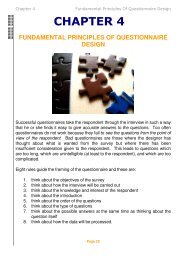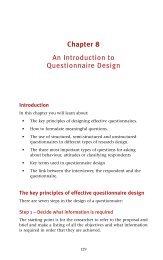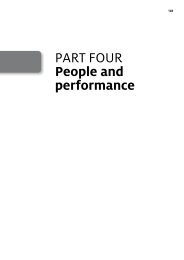The growing business handbook : inspiration and advice ... - Sparkler
The growing business handbook : inspiration and advice ... - Sparkler
The growing business handbook : inspiration and advice ... - Sparkler
You also want an ePaper? Increase the reach of your titles
YUMPU automatically turns print PDFs into web optimized ePapers that Google loves.
106 People <strong>and</strong> performance<br />
It is now recognized that short-term performance targets that led to generous<br />
bonus payments did not recognize the long-term risks of the behaviours they were<br />
enforcing. This lesson learned by the banks, at great cost, is one that all <strong>business</strong>es<br />
should consider. <strong>The</strong> key word is ‘risk’ <strong>and</strong> how that can be minimized while<br />
motivating <strong>and</strong> retaining individuals within the <strong>business</strong>.<br />
<strong>The</strong> reward mix<br />
<strong>The</strong> cost to a company of employee reward is one of its largest costs <strong>and</strong> it is critical<br />
that the company has the right mix of cash, equity <strong>and</strong> other forms of reward to drive<br />
performance.<br />
Smaller companies, or those in their infancy, may look more to equity as a means<br />
of attracting <strong>and</strong>/or retaining key individuals.<br />
Quantum of the reward<br />
<strong>The</strong> level of the reward should be a reflection of the performance <strong>and</strong> the associated<br />
impact for the <strong>business</strong>. <strong>The</strong> size of bonus pools should be linked to the overall<br />
performance of the company. Employees’ reward payments should thereafter be<br />
linked to both the individual’s performance <strong>and</strong> the performance of the <strong>business</strong>. In<br />
the situation where performance of the company is poor, employees should be clear<br />
that this will reduce the value of the reward delivered, if any reward is made at all.<br />
It is also critical to assess the level of reward payable at any one time, <strong>and</strong> how this<br />
will impact on the <strong>business</strong>, eg cash flow, <strong>and</strong> on the individual. Modelling a plan <strong>and</strong><br />
giving employees an indication of how their bonus might look given certain conditions<br />
is one way to reinforce what you expect from them <strong>and</strong> also helps manage their<br />
expectation.<br />
Managing risk<br />
Historically the link between performance, reward <strong>and</strong> risk was largely ignored.<br />
Reward arrangements were typically viewed as a means to attract, retain <strong>and</strong><br />
incentivize individuals. This in itself has elements of reducing risk because, for<br />
example, retention gives continuity <strong>and</strong> good performance, driving the <strong>business</strong><br />
forward.<br />
What we have seen recently, however, is that risk-taking behaviours to meet<br />
performance targets <strong>and</strong> deliver rewards severely impacted the global financial<br />
system, the ramifications of which have been widespread. As a result, companies are<br />
becoming more thoughtful in the way they structure reward to discourage excessive<br />
risk taking.<br />
<strong>The</strong>re are many ways to manage the risk elements; for example, making entry to<br />
an incentive plan conditional on risk-based performance conditions. Once a person is








